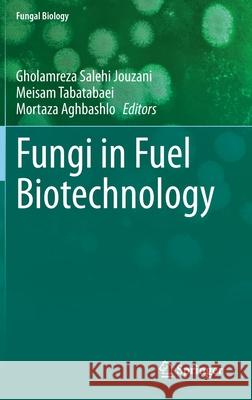Fungi in Fuel Biotechnology » książka
topmenu



Fungi in Fuel Biotechnology
ISBN-13: 9783030444877 / Angielski / Twarda / 2020 / 233 str.
Fungi in Fuel Biotechnology
ISBN-13: 9783030444877 / Angielski / Twarda / 2020 / 233 str.
cena 682,72
(netto: 650,21 VAT: 5%)
Najniższa cena z 30 dni: 655,41
(netto: 650,21 VAT: 5%)
Najniższa cena z 30 dni: 655,41
Termin realizacji zamówienia:
ok. 16-18 dni roboczych.
ok. 16-18 dni roboczych.
Darmowa dostawa!
Kategorie:
Kategorie BISAC:
Wydawca:
Springer
Seria wydawnicza:
Język:
Angielski
ISBN-13:
9783030444877
Rok wydania:
2020
Wydanie:
2020
Numer serii:
000454853
Ilość stron:
233
Waga:
0.52 kg
Wymiary:
23.39 x 15.6 x 1.6
Oprawa:
Twarda
Wolumenów:
01
Dodatkowe informacje:
Wydanie ilustrowane
Preface
1. Biofuels: challenges and the promises of fungi in biofuel production
Meisam Tabatabaei and Gholamreza Salehi Jouzani
2. Plant pathogenic fungi for bioethanol production: mechanisms of actions
Paul Christakopoulos, Luleå University of Technology, Luleå, Sweden
3. Plant pathogenic fungi for biodiesel production
Akihiko Kondo, RIKEN Center for Sustainable Resource Science, Yokohama, Japan4. Plant pathogenic fungi for VOCs production
Joan W. Bennett, Rutgers, The State University of New Jersey, New Jersey, USA
5. Plant probiotic fungi as a new source for Bioethanol Production
Ribo Huang, Guangxi University, Nanning, Guangxi, China
6. Endophytic fungi for biofuel production
Ranjan Kumar Bhagobaty, Oil India Limited, Noida, India
7. Brown and white
Jonathan S. Schilling, University of Minnesota, Minnesota, USA
8. Gut fungi for biofuel production
Michelle A. O’Malley, University of California Santa Barbara, California, USA
9. Consolidated bioprocessing: highly efficient fungi for biofuel production
Gholamreza Salehi Jouzani
Mohammad J. Taherzadeh, University of Borås, Borås, Sweden
Meisam Tabatabaei
10. Process design in fungal-based biofuel production systems
Keikhosro Karimi, Isfahan University of Technology, Isfahan, Iran
11. Life cycle assessment (LCA) of fungal-based biofuel production systems
Mohammad Ali Rajaeifar, University of Tabriz, Tabrīz, Iran
Reinout Heijungs, Vrije Universiteit Amsterdam, The Netherlands
12. Thermodynamics aspects of fungal-based biofuel production systems
Mortaza Aghbashlo Arun S. Mujumdar, McGill University, Quebec, Canada13. Modeling and optimization to enhance fungal-based biofuel production
Sulyman Hosseinpour, University of Tehran, Tehran, Iran
Mortaza Aghbashlo
S Venkata Mohan, Indian Institute of Chemical Technology, Hyderabad, India
Index
Dr. Gholamreza Salehi Jouzani is a Professor of Microbial Biotechnology at the Microbial Biotechnology Department of Agricultural Biotechnology Research Institute of Iran (ABRII). His research focus is agricultural microbial bio-products and biorefinery, including biofuels from biomass, biocompost, biopesticides, biofertilizers, and probiotics. Professor Salehi Jouzani has co-authored more than 100 peer-reviewed journal articles and book chapters, achieved more than 8 patents, and transferred two technologies to the private sector (h-index: 20, i10-index: 32). His publications have received 2221 citations. He has supervised more than 60 graduate students. In addition, he serves on the editorial board of several reputed journals including the Bioengineered (Taylor & Francis Online), Iranian Journal of Biotechnology, and Iranian Journal of Microbiology.
Dr. Meisam Tabatabaei is an Associate Professor of Environmental Biotechnology (Universiti Teknologi MARA-UiTM, Malaysia) and is the Founding Editor-in-Chief of Biofuel Research Journal (BRJ) in Canada. Meisam has been working closely with the United Nation Development Program (UNDP) to promote waste-oriented biofuels in the developing world. Since 2016, he has been the lead collaborator of the Lancet Commission on Public Health and Climate Change (UCL, UK) and has published over 250 publications including original research papers and reviews in journals such as The Lancet (Impact Factor: 59.102), Progress in Energy and Combustion Sciences (Impact Factor: 26.467), Renewable and Sustainable Energy Reviews (Impact Factor: 10.556), etc. (Citations: >7350, h-index: 43, i10 index: 147) He is currently also a Guest Professor at the Ho Chi Minh City University of Transport (Vietnam). Dr. Tabatabaei has been listed on the Web of Science Highly Cited Researchers List (Top 1% scientists in the world) in Engineering Category since 2017. He is the Editor of the Book Volumes "Biogas: Fundamentals, Process, and Operation” and "Biodiesel: from Production to Combustion" which have been published by Springer Nature in 2018 and is on the Editorial/Advisory Board of International Journal of Life Cycle Assessment (Springer), Data In Brief (Elsevier), MethodsX (Elsevier), and Energy Sources, Part A: Recovery, Utilization and Environmental Effects (Taylor & Francis). Meisam is the Associate Editor of Journal of Cleaner Production (Elsevier; Impact Factor: 6.395) and Frontiers in Energy Research. Dr. Tabatabaei is also the Guest Editor of Special Issues in Renewable & Sustainable Energy Reviews (Elsevier) and Energies (MDPI). Meisam is the Editor-in-Chief of the Elsevier Book Series on Biomass and Biofuels.
Dr. Mortaza Aghbashlo is an Associate Professor at the Faculty of Agricultural Engineering and Technology, University of Tehran, Iran. He has received University of Tehran’s award for Excellence in Research in 2008, 2012, and 2017. His research interests primarily include renewable energies, biofuels, exergy-based analyses, and sustainability assessment. With over 150 technical publications in highly referred journals such as Progress in Energy and Combustion Sciences, Fuel, Energy, Renewable and Sustainable Energy Reviews, etc., Mortaza is an established researcher in renewable energy technologies, engineering thermodynamics, and thermal engineering. He is also the Co-Editor of the Book Volume "Biodiesel: from Production to Combustion" which has been published by Springer Nature in 2018 and is on the editorial of Biofuel Research Journal and Frontiers in Energy Research.
Due to the huge quantity and diverse nature of their metabolic pathways, fungi have great potential to be used for the production of different biofuels such as bioethanol, biobutanol, and biodiesel. This book presents recent advances, as well as challenges and promises, of fungal applications in biofuel production, subsequently discussing plant pathogenic fungi for bioethanol and biodiesel production, including their mechanisms of action.
Additionally, this book reviews biofuel production using plant endophytic fungi, wood-rotting fungi, fungal biocontrol agents, and gut fungi, and it investigates highly efficient fungi for biofuel production and process design in fungal-based biofuel production systems. Finally, life cycle assessment of fungal-based biofuel production systems are discussed in this volume.
1997-2026 DolnySlask.com Agencja Internetowa
Zobacz: Księgarnia Czeska | Wydawnictwo Książkowe Klimaty | Mapa strony | Lista autorów
KrainaKsiazek.PL - Księgarnia Internetowa
KrainaKsiazek.PL - Księgarnia Internetowa









